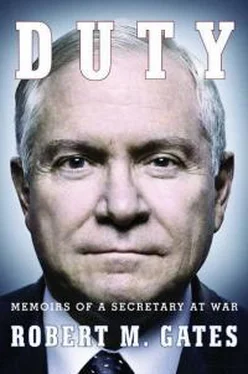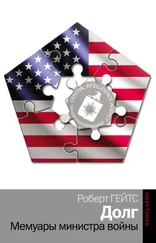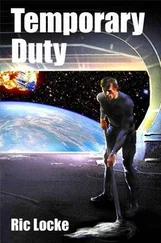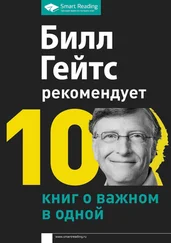I had served in the White House on the National Security Staff under four presidents and had strong views as to its proper role. I had come to learn that White House/NSS involvement in operations or operational details is usually counterproductive (LBJ picking bombing targets in Vietnam) and sometimes dangerous (Iran-Contra). The root of my unhappiness in the Obama administration was therefore not NSS policy initiatives but rather its micromanagement—on Haitian relief, on the Libyan no-fly zone, above all on Afghanistan—and I routinely resisted it. For an NSC staff member to call a four-star combatant commander or field commander would have been unthinkable when I worked at the White House and probably cause for dismissal. It became routine under Obama. I directed the commanders to refer such calls to my office. The controlling nature of the Obama White House, and its determination to take credit for every good thing that happened while giving none to the people in the cabinet departments—in the trenches—who had actually done the work, offended Hillary Clinton as much as it did me.
These issues did not begin under Obama. There has been a steady trend toward more centralized White House control over the national security apparatus ever since Harry Truman considered his principal national security advisers to be the secretaries of state and defense. (That they were Dean Acheson and George Marshall certainly helped.) But even Truman initially had opposed legislation creating the National Security Council, convinced that Congress was trying to impose “cabinet government” on him. Since then the presidential staff assigned to national security has increased many times over. As recently as the Scowcroft-led NSC staff in the early 1990s, professional staff numbered about fifty. Today the NSS numbers more than 350.
The controlling nature of the Obama White House and the NSS staff took micromanagement and operational meddling to a new level. Partly, I think, it was due to the backgrounds and résumés of the people involved. For most of my professional life, top NSC positions went to people who may have aligned with one party or the other, but they had reputations in the foreign policy and national security arenas that predated their association with the president—either from academia (such as Henry Kissinger, Zbigniew Brzezinski, Condi Rice) or longtime service in the military, intelligence, or foreign policy arenas (such as Frank Carlucci, Jim Jones, Colin Powell, Steve Hadley, Brent Scowcroft, and me). Inevitably there were some politically or personally connected handlers as well, but they were the exceptions. Obama’s top tier of NSS people, though, was heavily populated with very smart, politically savvy, and hardworking “super staffers”—typically from Capitol Hill—who focused on national-security-related issues only as their careers progressed. This changed profile may explain, in part, their apparent lack of understanding of or concern for observing the traditional institutional roles among the White House, the Pentagon, and the operational military.
Stylistically, the two presidents had much more in common than I expected. Both were most comfortable around a coterie of close aides and friends (like most presidents) and largely shunned the Washington social scene. Both, I believe, detested Congress and resented having to deal with it, including members of their own party. And so, unfortunately, neither devoted much effort to wooing or even reaching out to individual members or trying to establish a network of allies, supporters—or friends. They both had the worst of both worlds on the Hill: they were neither particularly liked nor feared. Accordingly, neither had many allies in Congress who were willing to go beyond party loyalty, self-interest, or policy agreement in supporting them. In this, they had more in common with Jimmy Carter and Richard Nixon than with LBJ, Ford, Reagan, and Bush 41. Nor did either work much at establishing close personal relationships with other world leaders. Bush did somewhat more of this than Obama, but neither had anything like the number of friendships cultivated by Ford, Reagan, and Bush 41. (I don’t know about Clinton; I wasn’t there.) Both presidents, in short, seemed to me to be very aloof with respect to two constituencies important to their success in foreign affairs.
Both were generous, kind, and caring when it came to men and women in uniform and their families. Both presidents—and their wives—devoted significant time and energy to helping the wounded and all military families. Helping those families was particularly important to Michelle Obama and Jill Biden. Both presidents regularly, privately, visited our wounded at hospitals and met with families of the fallen. No one could have asked either to do more or to care more. As was fitting.
Their relationship with me was friendly and relaxed but businesslike. President Obama had much more occasion than Bush to be angry with me, but by the standards of Johnson and Nixon—whose wrath could be semiterrifying even to the most senior officials—Obama was civil in his impatience, never nasty, cutting, or personal. And the squall always passed quickly. At times, I’m sure he treated me better than I deserved.
I witnessed both of those presidents make decisions they believed to be in the best interest of the country regardless of the domestic political consequences, both thereby earning my highest possible respect and praise. Although, as I’ve said, political considerations were far more a part of national security debates under Obama, time and again I saw him make a decision that was opposed by his political advisers or that would be unpopular with his fellow Democrats and supportive interest groups. I liked and respected both men.
ON WAR
Until becoming secretary of defense, my exposure to war and those who were fighting wars had been at a distance, from antiseptic offices at the White House and at CIA. But I had read much history about war and its glories, follies, and horrors. Serving as secretary of defense made the abstract real, the antiseptic bloody and horrible. I saw up close the cost in lives ruined and lives lost.
Several lessons, none new to me, were hammered home during my four and a half years as defense secretary. Above all, the unpredictability of war—that once the first shots are fired or first bombs fall, as Churchill said, the political leader loses control. Events are in the saddle. It seems that every war is begun with the assumption it will be short. In nearly every instance, going back far into history, that assumption has been wrong. And so it happened again in Iraq and Afghanistan, as swift and successful regime changes gave way to long and bloody conflicts. In light of history, how could anyone have been surprised that our wars in Iraq and Afghanistan took unanticipated turns?
I was reminded, too, that nearly always, we begin military engagements—wars—profoundly ignorant about our adversaries and about the situation on the ground. We had no idea how broken Iraq was when we invaded and took control of the country. We did not grasp that after eight years of war with Iran, the Gulf War with us, and twelve years of harsh sanctions, the Iraqi economy, society, and infrastructure were shattered. The facade of Saddam’s regime misled us with regard to what we were letting ourselves in for, just as his facade with respect to possessing weapons of mass destruction misled us. We had no idea of the complexity of Afghanistan—tribes, ethnic groups, power brokers, village and provincial rivalries. So our prospects in both countries were grimmer than perceived, and our initial objectives were unrealistic. And we didn’t know that either. Our knowledge and our intelligence were woefully inadequate. We entered both countries oblivious to how little we knew.
Читать дальше












